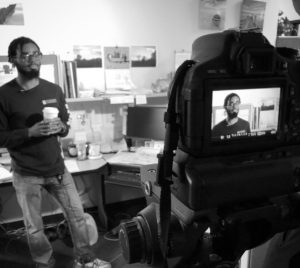5 Tips for Conducting Great Interviews
By Aamin Withrow-Davis, second-year graduate student in the Digital Media program
 In a majority of the classes I’m taking, I am required to interview a subject or a set of subjects.. Before this year of classes, my exposure to video creation and interviewing was limited to editing videos and watching interviews on television or some other platform. This experience has been an interesting and challenging one for me, however, it presented me with a chance to acquire new skills and polish others. From these experiences, I have compiled five helpful and important tips for interviewers.
In a majority of the classes I’m taking, I am required to interview a subject or a set of subjects.. Before this year of classes, my exposure to video creation and interviewing was limited to editing videos and watching interviews on television or some other platform. This experience has been an interesting and challenging one for me, however, it presented me with a chance to acquire new skills and polish others. From these experiences, I have compiled five helpful and important tips for interviewers.
First, make sure to know the equipment that you are using for the interview. You have to have a thorough knowledge of your equipment for several reasons: credibility, time and content. Not knowing your equipment lowers your credibility as an interviewer leading the subject to give low-quality content. Having a prolonged period of technical difficulties will make the subject feel as if their time is not valued and as a result, they will give short responses. Sometimes, a lack of knowledge of the equipment may cause the subject to reschedule, after which it may be harder to schedule a new time. As an interviewer make sure to always spend time getting to know at least the basics of each piece of equipment you are using.
Second, always go to the interview location and access it (best to do well before the date of the interview). This gives you a chance to inventory the lighting, noise and any other possible hindrances. This is an often overlooked aspect of interviews that may present a huge problem for you in post-production and can even cause your final production to be poor-quality. During the assessment, you may find that you have to choose a new location.
Also, make sure that the interview environment is appropriate for the interview. Does it fit the type of interview you are going to conduct? Is it clean and tidy? If you are going to conduct a two-way interview is there a place that allows you to accomplish that?
Third, before you conduct the interview make sure you turned off all electronics that may interfere with the interview. Cell phones, notifications and laptops are some of the most common ways for you and the interviewee to become distracted, however, there is another often overlooked way to become distracted. As the interviewer, you have to keep a focused mind on the interviewee and the interview itself. During the interview all your attention has to be concentrated on getting the information you need, keeping good video composition and watching the body language of the interviewee.
Fourth, Make sure to allow the interviewee to talk. Do not cut him or her off.
You can cause the interviewee to lose their train of thought by stopping or replying to them during the interview, possibly causing them to lose their train of thought, point them in the wrong direction or make them upset and give bad content.
Pro-tip: Give them a few seconds of silence after they have stopped talking. This will allow for them to rethink their answers. Which may lead them to answer it again or give additional information that may be better content.
Lastly, actively listen to them. What they are saying is important but don’t just listen to their words but also listen to their body language, both aspects give you a deeper look into the interviewee. Actively listening to them allows for you to take great notes and to find interesting detail in both what they are saying and how they are reacting to your questions.
As the interviewer, you have a set of duties that you have to accomplish well before the interview is conducted: being proactive, creative and diligent. Each previously mentioned duty helps to ensure that your final product will be high-quality.
I have written this article to make potential interviewers think about the interview process as a whole.
 Duquesne University Multimedia
Duquesne University Multimedia